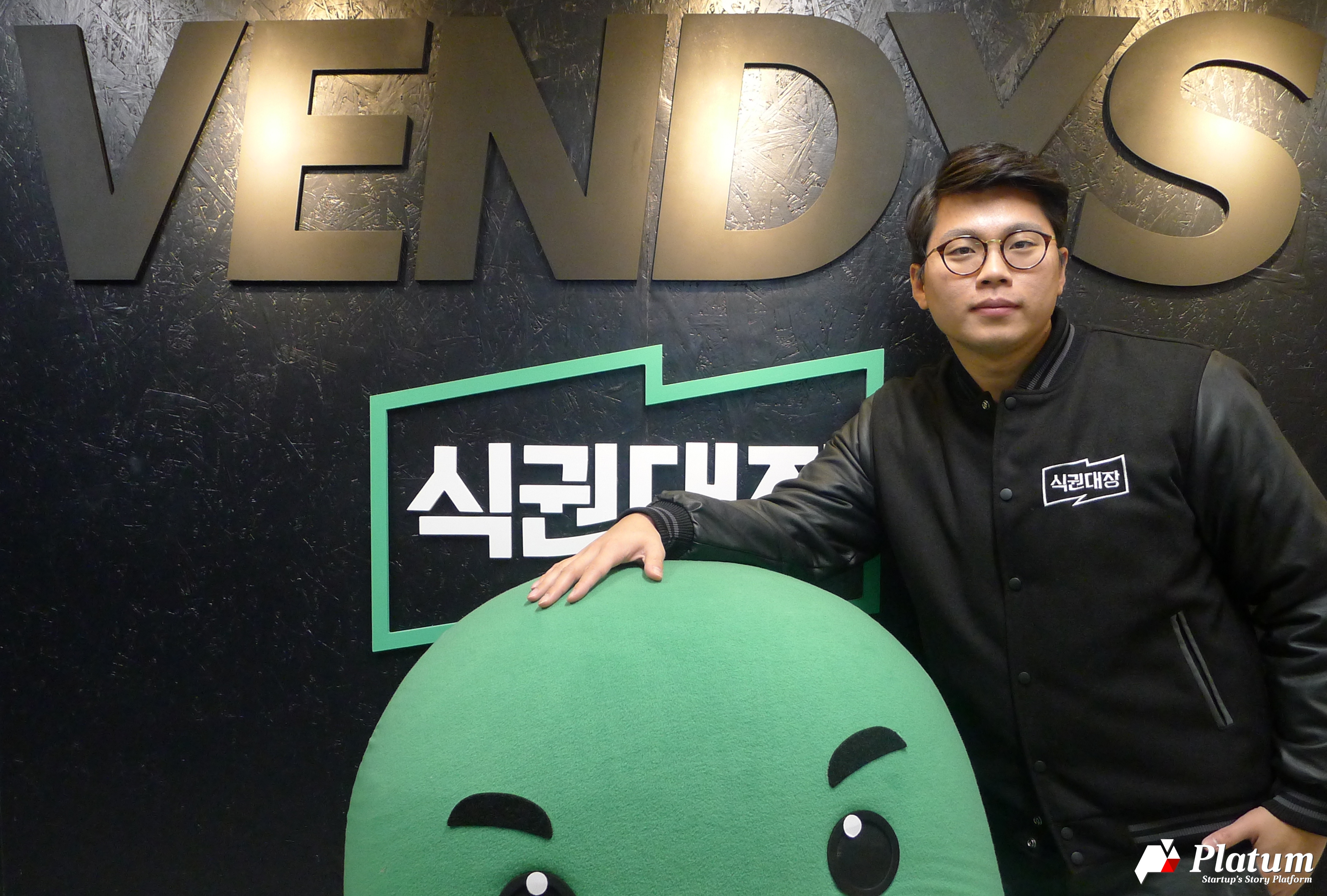Most Korean companies provide employees with meal vouchers for use in company cafeterias. Vendys is quickly revolutionizing Korea’s corporate meal voucher system by moving paper coupons onto a mobile platform. Through Vendys, companies can now handle distribution and payment of vouchers via mobile.
In 2015, Vendys was the first company in the world to dive into the business of transforming traditional paper meal vouchers into mobile. The history of traditional paper meal vouchers traces back far world-wide; it started in the 1960s in South America, Europe and Japan. Decades later, we now see mobilization of vouchers that were once traditionally handled as physical, paper vouchers through evolving mobile and NFC (Near Field Communication) technology.

Interview with Vendys’ founder Jung-Ho Cho
We interviewed founder Jung-Ho Cho (pictured above), who is now in his seventh year of a startup career. While he was once on a path to taking his bar exam, he is now responsible for meals of over 100 companies’ employees in Korea.
Q) How did you end up tackling the topic of corporate meal vouchers?
In my previous startup experience, I worked on mobile vouchers. I was approached with a project for a large gaming company that sought to provide its employees with mobile gift vouchers instead of paper vouchers. In the development process, we learned that most restaurants in the financial district of Seoul were still accepting paper vouchers. That was when we realized that there was a significant inefficiency with dealing paper vouchers for all parties involved — the employees, employers and restaurants. In a world where people no longer carry cash and mobile payments are on the rise, dealing with paper vouchers seemed largely outdated.
Q) How is Vendys tackling the inefficiencies of the existing voucher ecosystem?
First, we help companies eliminate the physical process of producing, distributing and collecting meal vouchers. Companies rarely regard this rather-tedious process as a high business priority; yet, at every month-end, they find themselves spending significant hours on voucher accounting. The time-consuming process is due to companies needing to physically visit their partner restaurants and vendors to collect their vouchers. A domestic airline for example spends a lot of energy accommodating the mealtimes of its ~700 flight attendants and their unique schedules. Second, we help companies reduce costs. It is common to have at least a team of four within a company working solely on voucher-related work. That is a very costly process that can be highly mobilized and automated. The use of mobile to take care of all aspects of the voucher ecosystem significantly saves resources of all involved parties. Through Vendys, companies can see up to 80% reduction in workload related to vouchers.
Q) What are the benefits for employees?
The most common conflict between company management and its employees is around the number of partner restaurants/vendors. Employees want more and diverse restaurants to eat from. Management often wants fewer restaurants to reduce partnership-related workload. Through Vendys, companies no longer need to handle partnerships with restaurants, and employees are given a wider array of restaurant options. More importantly, nobody has to carry paper vouchers.
Q) What is the most common conflict between companies and partner restaurants?
Partner restaurants rely heavily on contracts with companies for use of vouchers, as the majority of customers during lunch hours near office spaces are working individuals who use company meal vouchers. Since voucher contracts are significant to their business, restaurants often forego small-to-big issues that arise with voucher use in order to avoid potential conflicts with companies that could lead to contract termination. Contract termination creates a greater loss to restaurants than to companies, causing a power imbalance in the partnership. Vendys eliminates such potential issues in these partnerships. We act as the middleman, with all of our work done via mobile, creating accuracy and clarity in the voucher accounting process.
Q) Tell us about the difficulties of entering this niche market.
We had zero client in our first year. People were unfamiliar with the idea of a mobile voucher. We couldn’t set up any partnerships as we did not have client companies to work with. I had no existing professional network to fall back on, and the more traditional ways of sales in B2B (Business to Business) didn’t seem to fit our work. Then one day, a published article about Vendys opened the first door to new business. We started to focus on our public relations and that sparked our engines.
Q) Can you share with us any tips on offline sales tactics?
We target restaurants/vendors that accept vouchers. Our first order of business is usually to create a list of companies that use meal vouchers. We build these lists from scratch as there is no existing data on the partnerships between companies and restaurants. In our early days, we visited every single restaurant near office buildings in every major neighborhood. Then we learned that interestingly, every company that uses vouchers has partnerships with at least one kimbap (Korean seaweed rice rolls) and one Chinese restaurant. Thus, we began visiting specifically kimbap and Chinese restaurants to find companies to work with. Once we know the companies, we know the restaurants, so the process has become much simpler. Once we figured out where the source of information lies, our sales strategies became more efficient.
Q) How did restaurant vendors respond to having to change their existing ways of business?
People are generally resistant to change at first, especially if it involves transforming an existing system. We focused on relationship building, with our Local Care Team holding frequent events for restaurant owners. We would send them flowers on Father’s Day and snacks on Pepero Day. We wanted to make sure they felt our respect for their businesses.
Q) Vendys is now serving 100 companies?
The mobile meal voucher market is finally evolving. We are receiving significantly more requests from companies that are interested in our services. There are companies that once rejected us in our earlier days that are coming back to us, and we thank them for their continued interest and trust in our business.
Q) Can companies of larger size create their own mobile meal vouchers?
The process of creating mobile meal vouchers in-house requires significant resources. Many companies find it more cost- and time-effective to have Vendys provide the service.
Q) What is the competition like?
We are aware of three to four main competitors, but we try not to focus on the negatives. There is a saying: “no startup fails because of competition;” rather, failures stem from internal issues. Vendys focuses on strengthening our businesses instead of worrying about external competition. We also take pride in being the leader of the mobile meal voucher market.
Q) What is the biggest risk factor to consider in ensuring your business grows?
Quality of service. Working with 100 companies means Vendys is in charge of all of their employees’ meals. People rely on Vendys to eat. If we ever have issues with the quality of our service, it will be hard to recover people’s trust in this B2B market. We need to make sure that restaurant vendors are satisfied with our service because without them, we have nothing to provide for companies. Our service is two-sided so we focus on providing the best possible experiences for both restaurants and companies.
Q) What is your partnership with Bae-Min Fresh (delivery service) like?
We are currently in charge of people’s lunch and dinner meals. However, we have been seeing a great need for breakfast meals at companies, so we felt that delivering breakfast items such as sandwiches would be most appropriate. Bae-Min Fresh delivers fresh food daily so naturally, a partnership with them created great synergies. The partnership is still in early stages and we expect to see positive results this year.
Q) What are Vendys’ plans for expansion?
There is a need for companies with cafeterias to work closely with their catering vendors in checking inventories. We see this as an area we can tap into, so we have developed a tech-driven reader service for companies to more thoroughly check their catering status. We currently provide this service to three to four companies.
Q) What is Vendys’ plan for the next round of funding?
We have completed our series A funding last fall and raised $4.2M. As of now, we have no immediate plans for another round.
Q) What are Vendys’ short-term and long-term goals?
Our short-term goal is to be everyone’s go-to for mobile meal vouchers and position ourselves as the leader in this market. In 2017, we will invest heavily in sales and marketing. We want more people to be exposed to mobile meal vouchers, especially because meal vouchers are used daily. Other than emails and online messengers, there is no other service that is used by every employee on a daily basis. That brings me to share our long-term goal, which is to bring various other corporate benefits onto a mobile platform. We want to provide mobile vouchers for all types of products and services that are simple and convenient for everyone to use.
source : techforkorea






Leave a Comment